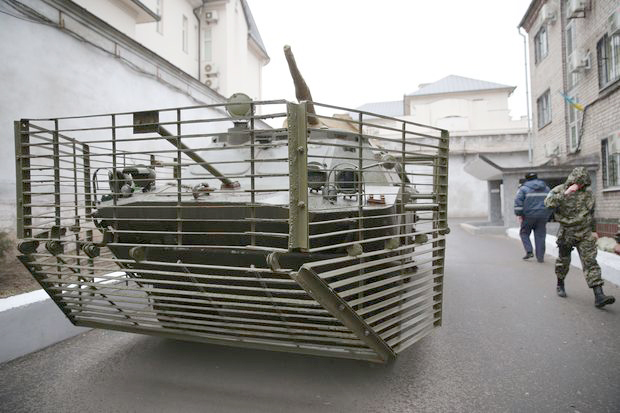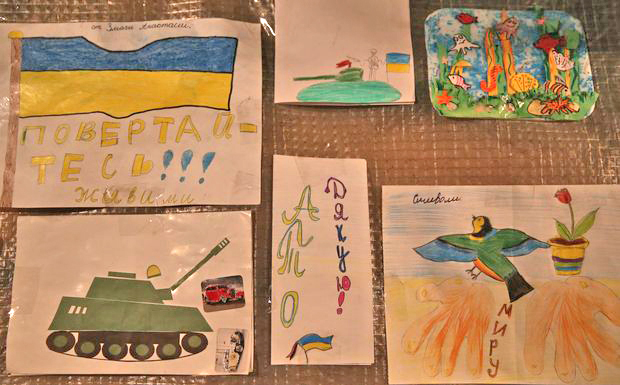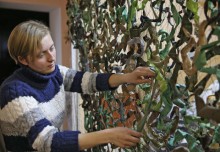Mariupol is the biggest city of the Donetsk Oblast on the territory controlled by Ukraine’s army. The front line lies 20 kilometers away. The first and main defense line in Mariupol is being held by volunteers, who gather at the Novy Mariupol Center. Mostly they are busy helping the army. Food and dishes are sent to the front, personal hygiene products, underwear and clothes go to the local hospital. Four months ago local women organized a sort of workshop at the Centre, where they make camo nets and ghillie suits.
“WE FEEL THE WAR WITH OUR SKIN”
“We are doing what our heart tells us to do,” says one of the volunteers, Natalia, without stopping her work for a moment. “As soon as we are done with house chores, we come here to make nets. Some come here right after work. Even though we do not come here every day, our thoughts are always at the ‘headquarters.’ I judge by myself. No matter where I am, I try to find an hour and come to help. There is no end to work, so I just must drop in and give a hand!”
They make camo nets of everything available, including old clothes and bedding. Wrong color? No problem, the cloth can be dyed and used.
Next to the nets ghillie suits are made.

PAST YEAR DURING THE VICTORY DAY FESTIVITIES TERRORISTS REDUCED THE MUNICIPAL POLICE DEPARTMENT TO ASHES. NOW THE POLICE ARE BETTER FORTIFIED: THE WINDOWS ARE BARRED, COMBAT VEHICLES ARE PARKED ON THE PREMISES, AND THE PERIMETER IS FENCED WITH BARBED WIRE
“It is no complicated work,” explains another volunteer, Tetiana. “Empty coffee sacks are delivered to our center. We cut them into rectangles, unravel the cloth and dye the yarn. Then we tie several threads to a net in a random pattern. We used to stretch the nets on chairs, but now we have to assistants: mannequins named Yanukovych and Vova Pukin.”
“These dummies were made for us by one of the volunteers’ husband,” adds Natalia. “When the dummies arrived, we decided that each must get a name. The first was dubbed Yanukovych, he is big and hulky. The other was thinner and fitter, so he was baptized Putin. At least they can be put to some use.”
For most volunteers working at the headquarters means also an opportunity to make new friends, meet like-minded people. Says Tetiana: “Some people who come here say that this work sort of recharges them. The situation in the city is complicated, but you relax when you come here. The people who work in the Center are not indifferent to what is going on around. It is so rewarding to talk to them.”
Besides camo, the ladies often make all manner of delicacies for the guys manning the checkpoints: home-made cakes and pies, pickles, anything they ask.
“The boys are not picky in terms of food,” goes on Natalia. “Sometimes they ask for something sour like pickles, because their rations are tasteless and set the teeth on edge. We often bake goodies to please the boys with home-made food. We always want to send them the best we have, so they knew that we care. When our volunteers deliver loads of stuff to the checkpoints, the men say with tears in their eyes, ‘Now we are not leaving, we know who we must defend.’”
It is hard to count all the activists who work on camo nets and ghillie suits. There are days when only a couple of them are at work, and on other days there can be a dozen. Natalia reckons that all in all they have some 50 regular volunteers. People are aware of the impending threat and will go a long way to avert it.
“Here the war is at an arm’s length, we feel it with our skin,” sums up Natalia.
KEEPING WATCH
Another important “shield” in Mariupol is the local police. Only a year ago it was rather disorganized, a lot of agents could not even handle a gun. Now out of the former 17,000 police officers of the Donetsk Oblast less than a half remain, but these men are prepared to face the danger and defend the civilians’ peace.
It turns out that the police of Mariupol keep watch not only in the streets, but also around the city. Here is one of the checkpoints. Less than five kilometers separate it from Shyrokyne, half-occupied by the invaders. All vehicles passing the checkpoint are thoroughly examined and the drivers are warned of possible shooting. The checkpoint self is also battered with shells every now and then. Uprooted trees along the road are silent witnesses. In the summer the fortifications at the checkpoint were on the surface, but after the first Grad bombardment dugouts appeared. Along with National Guards and frontier guards, this outpost is also manned by police officers from Mariupol.

THESE DRAWINGS DECORATE THE WALLS OF THE FIELD KITCHEN AT A CHECKPOINT NEAR VYNOHRADNE
The men are not really willing to talk: “We have come here to serve, not to wag our tongues.” However, later they agree to share about their work. They have 24-hour shifts, and their job is to examine the vehicles. There is hardly any time for rest. The checkpoint has storerooms with food supplies, and there is even a field kitchen, decorated with children’s drawings. While the men keep watch outside, the kitchen is guarded by a gray cat. He has been at the checkpoint for months, but as the men come and go, he remains nameless.
As far as Mariupol goes, the police must be able to defend not only the local population, but also themselves. Past year on Victory Day a subversive group assaulted the municipal police office. Shooting caused a fire, and the building burnt to ashes. The remaining part now resembles a fortress.
“The building is well-fortified,” says Volodymyr Khvostov, first deputy head of the municipal department of the Ministry of Internal Affairs. “I cannot say with certainty that we can repel an assault, but the defenses are much better than they used to be. The windows are barred, combat vehicles are parked on the premises, barbed wire runs along the perimeter. We hold systematic staff exercises in defending the premises.”
INFORMATION PRESSURE
Information space is Mariupol’s weak spot. Ukrainian TV stations are present here, but they are not very popular among the locals. According to the data provided by the National Board of Television and Radio, the audience of Ukrainian-speaking channels makes approximately 14 percent of the population, with Ukraina Channel as the leader. That is why it is hard to counteract the Kremlin’s information influence in the region.
Now Mariupol is being painted by Ukrainian media as one of the most patriotic cities in Donbas. We often hear stories about volunteers and conscientious citizens who donate their last possessions to the Ukrainian army. Yet volunteers emphasize that the situation is not that simple.
“Mariupol is described as a sort of outpost of all things Ukrainian,” says Natalia. “As if entire city joined in its efforts to help the army. In fact, it is not so. At least 70 percent of our population is pro-Russian and cherishes separatist sentiments. The pro-Ukrainian movement depends on a handful of brave spirits. Now everyone knows them, and if the so-called DNR grabs the city, they are as good as dead. The way how Mariupol is depicted in the press belittles the merits of these people. Other cities might think that being a volunteer here is easy-peasy, but in fact it is a feat of arms on a daily basis.”
In Natalia’s opinion, such neglect of the city’s main problem and attempts to heroize it only increases the influence of Russian propaganda on this territory. Ukrainian media distract attention from the situation in this region, but the problem remains.
“A trip to the market, and you get to hear such things that you have to take sedatives all day afterwards. It is impossible to see those faces and hear those horrible imprecations. Those people can only think in terms of sausage and vodka, and they do not want anything else,” sighs Natalia.
Yet in spite of it all, Mariupol persistently holds out against both the military and information attacks. The activists and volunteers are not even considering surrender. But in order for their work to bring fruit, they need support from outside.







